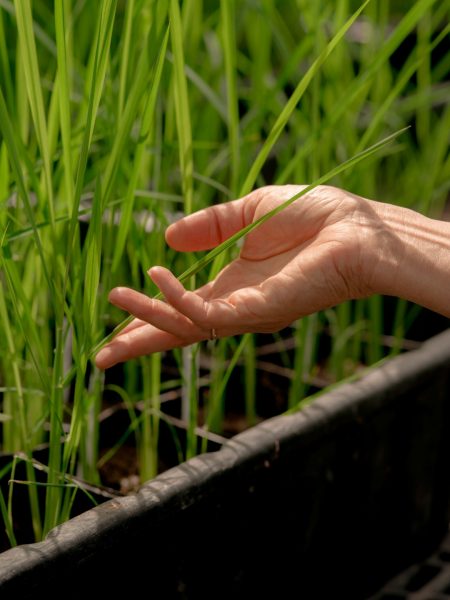May 18, 2017 – If growing conditions change for the world’s most important staple crops then humanity has a problem. Our population has just passed the 7.5 billion mark. That’s a lot of mouths to feed but not nearly as many as we will see by 2050 when researchers project 10 billion of us.
Climate change, when added to the population equation, puts us on pretty shaky ground related to food security. As we approach mid-century the food demands of the planet will become even more problematic.
At UC Davis, plant geneticist Pamela Ronald is researching new varieties of rice. It is hoped through genetic modification, rice, and other crops can handle all that our changing climate will deliver: droughts, monsoonal rains, more extremes of heat and cold, sea level rise, invasive species threats, and more.
Ronald has been working on genetically modified rice for several decades. She chose rice because it is the food staple most commonly consumed by more than half of the planet.
Today, one of her discoveries, rice containing a Sub1 gene, is grown by 5 million farmers on more than 2 million hectares (over 4.9 million acres). Sub1 GM rice is resistant to prolonged flooding. Its planting has restored the viability of farms that were experiencing rice losses amounting to 4 million tons annually prior to its invention. Today, with the help of the Bill andMelinda Gates Foundation, the Sub1 gene has been added to 10 Asian rice varieties which are being distributed to farmers in India, Bangladesh, Indonesia, Nepal and other South-Asian countries.
But flooding’s opposite, extreme drought, is seen as a much greater problem with climate scientists predicting a doubling of such events in South Asia and Sub-Saharan Africa by the end of the century. Based on climate models scientists forecast that higher carbon levels in the atmosphere by mid-century will reduce rice yields by 15% globally. That will put upward pressure on the price of this important food staple.
Studies of the socioeconomic consequences of food security are not the normal area of study for climate scientists. But for those studying food security, the impacts of climate change are very much apropos. A 2015 paper entitled, “Climate change impacts on agriculture in 2050 under a range of plausible socioeconomic and emissions scenarios,” appearing in IOP Science, analyzes the global and regional impacts of climate change on agricultural yields, looking at consumption and pricing. The authors conclude that climate change and high-carbon emission sensitivity will yield price shocks exacerbated by average yield drops globally of 6.9% by 2050. This will happen despite increased total hectares under cultivation and global trade in staple crops. Distribution of this phenomenon will be uneven globally impacting those regions currently most vulnerable to food shortages.
Ronald recognizes that manipulating genes has become a political football and a counter-narrative to the food challenges humanity is facing as the century unfolds. She states, “this focus on genes in our food is a distraction from the really, really important issues.” Drought-tolerant GM rice could be the difference between starvation or a sustainable diet for hundreds of millions of people in Sub-Saharan Africa and South Asia. Trying to develop drought-resistant rice by more traditional means would likely take far too long using conventional selective breeding, and may fail to produce the desired outcome even after multiple generations of experimentation.
We have the tools to meet the challenge. The distractions that keep on getting in the way have to disappear so that humanity by 2050 and beyond will be able to continue to feed itself in a sustainable way.
















